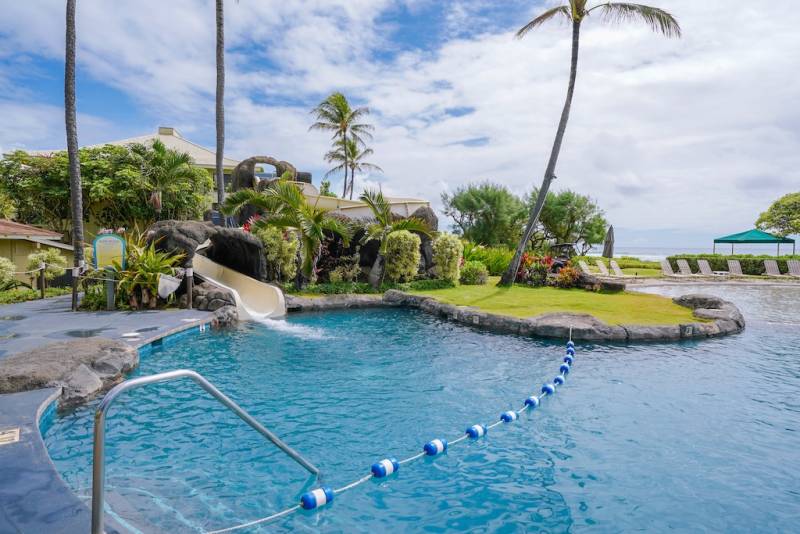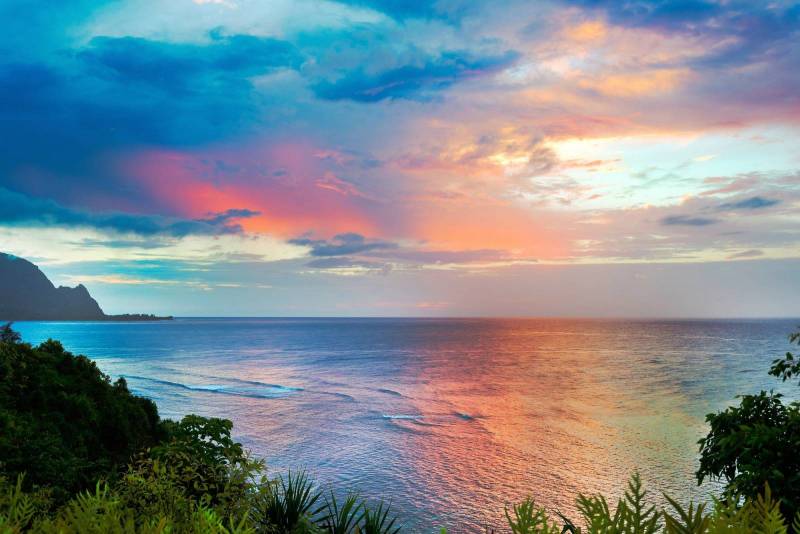Working in a vacation and second home market means that many of our clients are investors who live off island. In 2019, approximately 37% of all sales on the island of Kauai were to off-island investors. Usually the process of purchasing a Hawaii vacation rental begins online, with a lot of research. Because this is an area of expertise for me, I field a lot of questions! Here are some of the most frequently asked questions, along with the answers. This is just a starting point. Feel free to contact us directly with more specific questions.

#1 Are There Vacation Rentals that “Pencil Out” and Pay for Themselves?
This is a question that I hear often, from potential investors, considering investing on Kauai or other Hawaiian Islands. It sounds like the perfect scenario: a foolproof, risk-free investment that reaps nothing but benefits for the owner. If it were that easy, everybody with cash to put down would own a vacation rental investment on Hawaii. In reality, no matter how favorable the numbers look on paper, there are always potential risks involved with investing, and vacation rental ownership. Any event that impacts tourism could leave you with the responsibility of covering all your costs for an extended period of time.
While there are sometimes cash flowing properties (depending on how much money you put down), I advise my clients to consider the “big picture” when it comes to investing here on Hawaii, and make sure you have reserves to cover unexpected vacancies. Consider the rental income a bonus that helps you cover your expenses and offsets some of the costs of owning property on Hawaii. The bigger picture is that you are making a long-term investment on an island with limited supply, that will appreciate over time. Hopefully you will get to enjoy your vacation rental for years to come and create a legacy of memories and long-term growth for your family.
#2 What Are the Typical Costs to Consider When Evaluating a Vacation Rental Investment?
Of course, if you get a loan for your investment property, there will be a mortgage payment. Usually the Homeowner’s Insurance can get wrapped into that monthly liability. There are even insurance policies designed specifically for the vacation rental industry, which account for loss of use should the property suffer a loss, such as fire or flood. In addition, one of the largest fees to consider is the HOA or Homeowner’s Association fee. Sometimes this is also called management, maintenance or AOAO fees. Depending on the amenities and the location of the property, this can be expensive. For example, oceanfront properties will always have higher costs for flood and hazard insurance.
Another major cost to consider is management of your vacation rental. Typical management fees run from 20-40%. It is considerably more expensive to have on-site management, which includes a check-in desk, although for investors who want to take a “hands off” management approach, it can be the easiest route. It is also a great perk for guests to have that convenience and resource.
It is important to interview the companies you are considering and find out what is included in the management fees. Housekeeping? Quarterly tax filings? Any routine maintenance? Also, what is their track record? What is the typical occupancy rate they are able to produce for their clients? Does their website get traffic and produce results, or do they rely on other hosting websites, like VRBO.com, Airbnb.com or Flipkey.com to get bookings? It is also important to strategize with your property manager and determine what your priorities are – is higher occupancy more important, or would you rather charge a higher rate and be comfortable with lower occupancy? It can be a balancing act to establish the right rate, and it can fluctuate depending on the season. It is crucial to take an adaptive and proactive approach to establishing your nightly rate. Working with an expert can be a wise strategy.
#3 Can I Save Money by Managing a Vacation Rental Myself?
Yes – we do see people manage their own vacation rentals with success, but it does take time. You must quickly and effectively handle all communication with guests and potential renters. You must be able to handle any issues or repairs with expedience and great customer service. You need to have great house cleaners and maintenance people on hand to help. Positive reviews are crucial to your business and having a clean and well-maintained space is mandatory. Fast responses and effective communication are also key. A great support team can help.
It is also a Hawaii state law that you must have an on-island representative to help manage if you do not live on Island, in case of emergency.
#4 What Are the Tax Implications of Owning and Operating a Vacation Rental on Hawaii?
I am not a tax professional, so I must disclose it is always best to discuss tax implications with a licensed CPA or Accountant. However, I can tell you that if you operate a vacation rental in Hawaii, you will need to get a General Excise Tax license and will be subject to Transient Accommodation tax. These taxes are usually imposed by owners on their guests and become a “pass-through” expense.
There is also a higher property tax rate imposed on short-term vacation rentals. Here is a link to current tax rates on Kauai.
Finally, if and when you decide to sell your vacation rental on Kauai, there will be additional taxes withheld at closing if you are a non-Hawaii resident, and/or a foreign investor. Here is a link with more information.
#5 Where Are the Best Places to Vacation Rent on Hawaii?
Here on Kauai, we have designated areas where short-term or “vacation renting” is allowed. These areas are also known as the Visitor Destination Area (VDA). The purpose of having a designated VDA is to preserve residential housing for local residents, which is currently at a shortage. The County of Kauai estimated in 2019 that we were 10,000 housing units short of meeting our population demands. Obviously putting available housing into the vacation rental pool takes it away from residents and can be detrimental. So ordinances have been put in place to restrict where vacation rentals are allowed to operate.
The areas that have been designated as VDA are in the resort areas of Poipu, Princeville, and on the Coconut Coast of Kapaa. These are areas where resorts and hotels are also located, along with shopping and restaurants.
There are also a select number of homes outside the VDA that have Transient Vacation Rental (TVR) permits. These homes were operating as vacation rentals prior to the designation of the VDA, and have been “grandfathered” into the system. However, each home with a TVR is required to re-apply annually for a new TVR permit, and if the deadline is missed, even by one day, the TVR permit goes away. There are stricter laws on other islands. For example, on Maui, a TVR permit is non-transferrable, so if a property sells, the new owner can no longer vacation rent the property as the previous owner did for homes and condos outside their VDA.
Since each island is different, it is important to consult with a vacation rental expert on the island you are interested in. Contact me for a referral – I know some of the best agents on all the islands.
#6 When is the “Busy Season” for Vacation Rentals?
Historically, the busiest times of year for Kauai travel have been in the winter months (November-February), spring break months (March-April) and summer months (June-August). May and October used to be slower times. However, prior to Covid-19 travel restrictions, we have pretty much seen a disappearance of the slow season. As direct flights to Kauai increased, so did travelers. And the popularity of self-contained accommodations offered by vacation rentals has increased. Up until recently, occupancy rates have been averaging around 75% island-wide. This is the number I use in my return on investment spreadsheet calculator, which I think is conservative. There are many other factors influencing occupancy, such as the price point and online marketing. An oceanfront home that rents for $5,000 – $10,000 per night is going to have a lower occupancy rate because the pool of travelers seeking accommodation in that price range is more limited. Similarly, a condo that rents for $150/night is going to be booked more often because the pool of renters is bigger.
#7 How Much Money Do I Need to Put Down for a Vacation Rental or Second Home?
I highly recommended connecting with a Hawaii-based lender as early in the process of investigation as possible. They will be able to advise you and guide you on exactly what documentation will be needed for your purchase, as well as advise you on how much to plan to have as a down payment, and how much cash you will need in the bank as “reserves.” In general, 20-25% down is the minimum. The more you put down, the better your interest rate. You should also plan to have enough additional money in the bank for at least 6 months of reserves that would allow you to cover all of the expenses at your primary residence and your new investment. Most lenders will require this. The more properties you have, the more complex the calculations can become. I have some wonderful local lenders I refer my clients to, and they are very helpful.
#8 What Are the Pros and Cons of Owning a Short-Term Versus a Long-Term Rental?
When considering either investment strategy, it is important to think about your long and short-term goals. Vacation rentals can bring in significantly higher income than a long-term rental, however, there is also more risk involved, especially in the event tourism is halted. Of course, you can always convert a short-term rental to a long-term rental, but they typically have higher price tags from the get go, so your operating expenses will be higher. You also have to consider the amount of work and wear and tear that comes with the higher-volume and turn-arounds in a vacation rental. You will find yourself fixing things more often, and with quite a few more regular expenses, like cleaning, management fees and replacement of soft goods (linens, towels) or furnishings that get damaged.
Homes and condos in the VDA are often in prime beachfront locations, with shopping, restaurants and amenities that are desirable for enjoying the lifestyle offered in Hawaii. Over time, these are also often areas that will appreciate at higher rates. But in the short term, they can be more volatile markets, subject to market fluctuations and economic factors. When the economy is more depressed, they are impacted the most, whether it is because there are less travelers (as seen after 9/11, the 2008 market collapse or 2020 Covid-19), or because as money gets tighter for people, their second homes are the first to go. Hawaii is unique because we have limited properties available, and historically the available supply is low.
Another advantage of a short-term vacation rental investment is the opportunity to use your property and enjoy it yourself, which you can’t reliably do with a longer-term investment unless you come between tenant turnovers, in which case you might find yourself busy with repairs and work while you are visiting. There is more flexibility and freedom in short-term rentals, because you can pencil in time for yourself when you desire to be here.
Either way, I believe in the long-term growth and investment in real estate and believe it will continue to appreciate over time. It is a tangible asset. People need homes. I think Hawaii is a great place to own real estate and a solid long-term investment when you have the right tools and resources in place to help preserve and maintain your investment.

There are a wide variety of vacation rental homes and condos available on the market, with prices ranging from under $100,000 for a studio-size room with no cooking facilities, to $20 Million + for prime beachfront homes. Here is a listing we currently have on the market in Plantation Hale, which is one of Kauai’s most affordable and best values for a vacation rental condo: 05-25 Aleka Loop #J6
Want to Know More?
Do you have more questions about purchasing an investment property on Kauai? Please don’t hesitate to reach out to our team. We are here to assist you.

Margaret Wilson
February 28, 2021
We own 1 week, 1 br, sleeps 4 at Maui Beach Vacation Club at Kihei, Maui. Currently we are booked to stay Dec. 5-12, 2021 and Jan. 7-14, 2022. We need to rent this out ASAP @ $2 k per week. Also, sell for $10 k. We are extremely happy owners but health worsened. Can you help? Also we need to rent lodging for of us at Kauai 12/25/21-Jan. 1, 2022